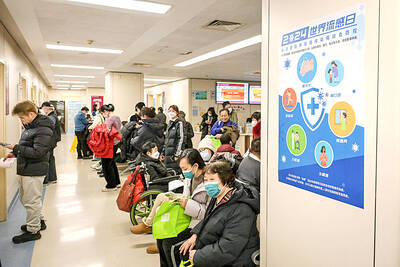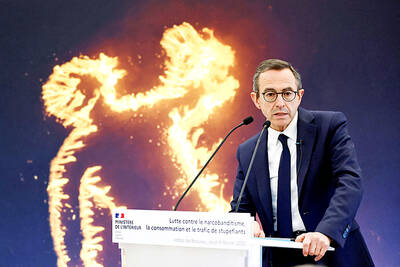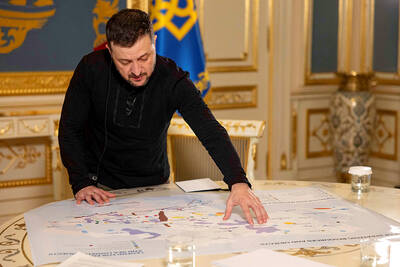French President Emmanuel Macron sought to calm flaring tensions with Muslims around the world on Saturday last week, telling Qatar-based TV channel Al-Jazeera that he understood that caricatures of the Prophet Mohammed could be shocking while lashing out at “lies” that the French state was behind them.
France is on edge after the republication in early September of cartoons of the prophet by the satirical magazine, Charlie Hebdo, which was followed by an attack outside its former offices, the beheading of a teacher and an attack on a church in Nice on Thursday last week that left three dead.
Macron sparked protests across the Muslim world after the murder earlier this month of a teacher, Samuel Paty, who had shown his class a cartoon of Mohammed, by saying that France would never renounce its laws permitting blasphemous caricatures.

Photo: EPA-EFE
In an apparent bid to reach out to Muslims, Macron gave a long interview setting out his vision to the TV channel, seeking to strike a softer tone.
“I can understand that people could be shocked by the caricatures, but I will never accept that violence can be justified,” he said.
“I understand the feelings that this arouses, I respect them. But I want you to understand the role that I have. My role is to calm things down, as I am doing here, but at the same time it is to protect these rights,” Macron said.
“I will always defend in my country the freedom to speak, to write, to think, to draw,” he added.
Macron lashed out at “distortions” from political leaders over the cartoons of the prophet, saying that people were too often led to believe that they were a creation of the French state.
He slammed “a confusion that has been fed by many media — and sometimes political and religious leaders — which is to say that these caricatures are in a way the project or the creation of the French government or the president.”
He also denounced calls for a boycott of French goods, backed in particular by Turkish President Recep Tayyip Erdogan and taken up by some retailers in Muslim countries, as “unworthy” and “unacceptable.”
Macron said that the campaign was created by some private groups “who relied on lies... sometimes from other leaders” about the caricatures.
Even before the attack on Paty, Macron had promised a tough new campaign against Islamist radicalism in France, after terrorist attacks claimed the lives of hundreds of people since 2015.
Protests erupted on Friday last week in Afghanistan, Pakistan, Bangladesh, Mali, Mauritania and Lebanon, the latest in a string of mass rallies denouncing France.
The European country is still reeling from the latest attack in Nice, which Macron has already described as “Islamist” terror.
French authorities were on Saturday last week seeking to ascertain if a Tunisian suspected of killing three people in a knife rampage inside a Nice church had outside help.
Brahim Issaoui, 21, only arrived in Europe from Tunisia last month and, according to prosecutors, killed a church employee, and two women in the attack in Nice’s Notre-Dame Basilica on Thursday last week.
The attacker cut the throats of Vincent Loques, 55, and Nadine Devillers, 60. A Brazilian woman, Simone Barreto Silva, who was also stabbed, took refuge in a nearby restaurant, but died of her wounds there.
Issaoui was shot by police multiple times and is in a grave condition in hospital. Investigators have been unable to question him and his precise motivations remain unclear.
“It is still too early to say if there were others complicit, what his motivations were in coming to France and when this idea took root in him,” said a source close to the inquiry who asked not to be named.
Investigators believe that Issaoui traveled illegally to Europe via Italy’s Mediterranean island of Lampedusa on Sept. 20. He arrived at the mainland Italian port of Bari on Oct. 9 before coming to Nice just one or two days before the attack.
French police on Saturday last week arrested another Tunisian man, bringing the number of people being held in connection with the deadly attack in Nice to four.

RIGHTS FEARS: A protester said Beijing would use the embassy to catch and send Hong Kongers to China, while a lawmaker said Chinese agents had threatened Britons Hundreds of demonstrators on Saturday protested at a site earmarked for Beijing’s controversial new embassy in London over human rights and security concerns. The new embassy — if approved by the British government — would be the “biggest Chinese embassy in Europe,” one lawmaker said earlier. Protester Iona Boswell, a 40-year-old social worker, said there was “no need for a mega embassy here” and that she believed it would be used to facilitate the “harassment of dissidents.” China has for several years been trying to relocate its embassy, currently in the British capital’s upmarket Marylebone district, to the sprawling historic site in the

A deluge of disinformation about a virus called hMPV is stoking anti-China sentiment across Asia and spurring unfounded concerns of renewed lockdowns, despite experts dismissing comparisons with the COVID-19 pandemic five years ago. Agence France-Presse’s fact-checkers have debunked a slew of social media posts about the usually non-fatal respiratory disease human metapneumovirus after cases rose in China. Many of these posts claimed that people were dying and that a national emergency had been declared. Garnering tens of thousands of views, some posts recycled old footage from China’s draconian lockdowns during the COVID-19 pandemic, which originated in the country in late

French police on Monday arrested a man in his 20s on suspicion of murder after an 11-year-old girl was found dead in a wood south of Paris over the weekend in a killing that sparked shock and a massive search for clues. The girl, named as Louise, was found stabbed to death in the Essonne region south of Paris in the night of Friday to Saturday, police said. She had been missing since leaving school on Friday afternoon and was found just a few hundred meters from her school. A police source, who asked not to be named, said that she had been

BACK TO BATTLE: North Korean soldiers have returned to the front lines in Russia’s Kursk region after earlier reports that Moscow had withdrawn them following heavy losses Ukrainian President Volodymyr Zelenskiy on Friday pored over a once-classified map of vast deposits of rare earths and other critical minerals as part of a push to appeal to US President Donald Trump’s penchant for a deal. The US president, whose administration is pressing for a rapid end to Ukraine’s war with Russia, on Monday said he wanted Ukraine to supply the US with rare earths and other minerals in return for financially supporting its war effort. “If we are talking about a deal, then let’s do a deal, we are only for it,” Zelenskiy said, emphasizing Ukraine’s need for security guarantees